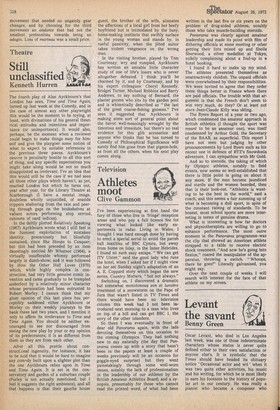Television
Athletes moot
Clive Gammon
I've been experiencing at first hand the fury of those who live in 'fringe' reception areas and who pay a full licence fee for viewing what looked like early experiments in radar. Living in Wales, I thought I was hard enough done by having to erect a special aerial to avoid the parish hall inanities of BBC Cymru, but away from home on Islay, in the Inner Hebrides, I found no such easy escape. "We can get ITV Ulster," said the good lady who runs the hotel, when I asked her if I might view on her set Sunday night's adaptation of an A. E. Coppard story which began the new series, Country Matters, " but not always."
Switching on, I discovered a dramatic but somewhat monotonous son et lumiere treatment of a snowstorm on the Paps of Jura that wasn't listed in TV Times and there would have been no television column this week had I not been introduced next morning to a man who lives on top of a hill and can get BBC 1, the envy of the other islanders. So there I was eventually in front of dear old Panorama again, with the lads devoting themselves on this occasion to the coming Olympics. They had nothing new to say naturally (the day that Panorama comes up with a story that hasn't been in the papers at least a couple of weeks previously will be an occasion for goggle-eyed surprise) but they went painstakingly through some well-worn issues, notably the lack of professionalism in the leadership of our athletes by the British Amateur Athletics Board; and a synopsis, presumably for those who cannot read the printed word, of what had been
written in the last five or six years on the problem of drug-aided athletes, notably those who take muscle-building steroids.
Panorama was clearly against amateur leadership and made its point with film of dithering officials at some meeting or other getting their lists mixed up and Sheila Sherwood, a silver medallist at Tokyo, sulkily complaining about a foul-up in a hotel booking.
I found it hard to make up my mind. The athletes presented themselves as unattractively childish. The unpaid officials were overwhelmed by their responsibilities. We were invited to agree that they order these things better in France where there are paid officials. The trouble with that argument is that the French don't seem to win very much, do they? Or at least not since Jean-Claude Killy was skiing.
The Byers Report of a year or two ago, which condemned the amateur approach in British athletics (I thought the sport was meant to be an amateur one), was itself condemned by Arthur Gold, the Secretary of the BAAB, as superficial. This report I have not seen but judging by other pronouncements by Lord Byers such as his recent one in defence of RTZ's Snowdonia adventure, I can sympathise with Mr Gold.
And so to steroids, the taking of which by Olympic athletes, notably in field events, now seems so well-established that there is little point in going on about it any more. If the men become jaundiced and sterile and the women bearded, then that is their look-out. "Athletics is wanting to be the best in the world," said a coach', and this seems a fair summing up of what is becoming a dull sport, in spite of the constant raising of standards. To be honest, most school sports are more interesting in terms of genuine drama.
What is interesting is how far doctors and physiotherapists are willing to go to enhance performance. The most outre moment in the Panorama programme-was the clip that showed an American athlete strapped to a table to receive electric shock treatment. "And now he's going into flexion," roared the manipulator of the apparatus, throwing a switch. "Whoops, there he goes!" Literally galvanised, you might say.
Over the next couple of weeks I will search with interest for the face of that athlete on my screen.










































 Previous page
Previous page